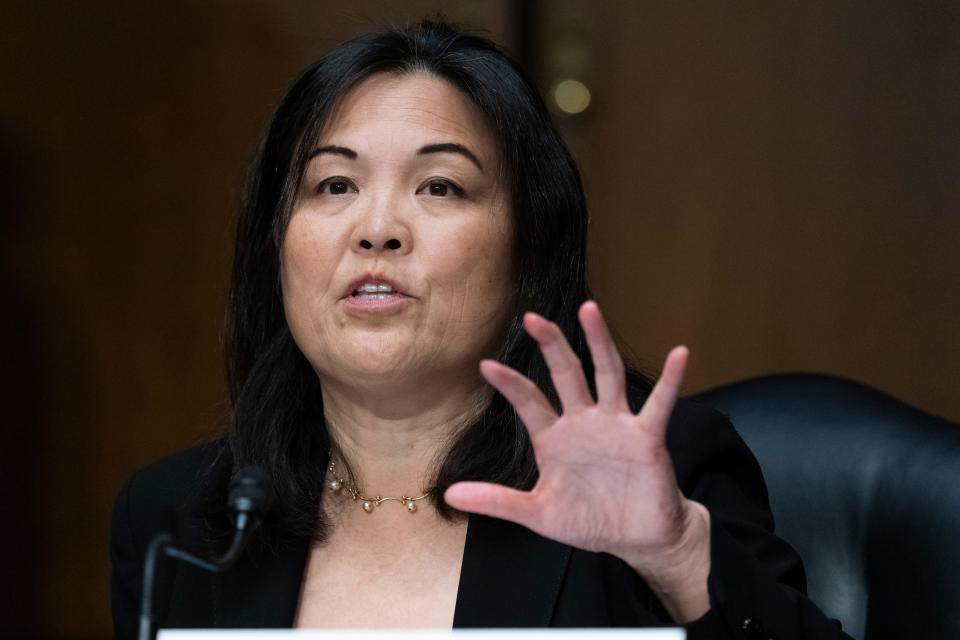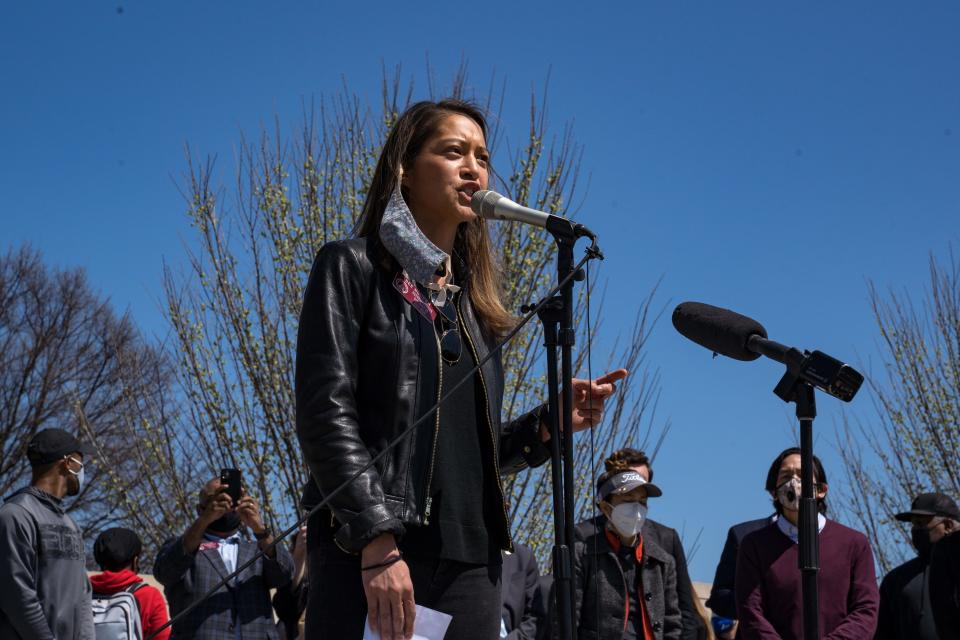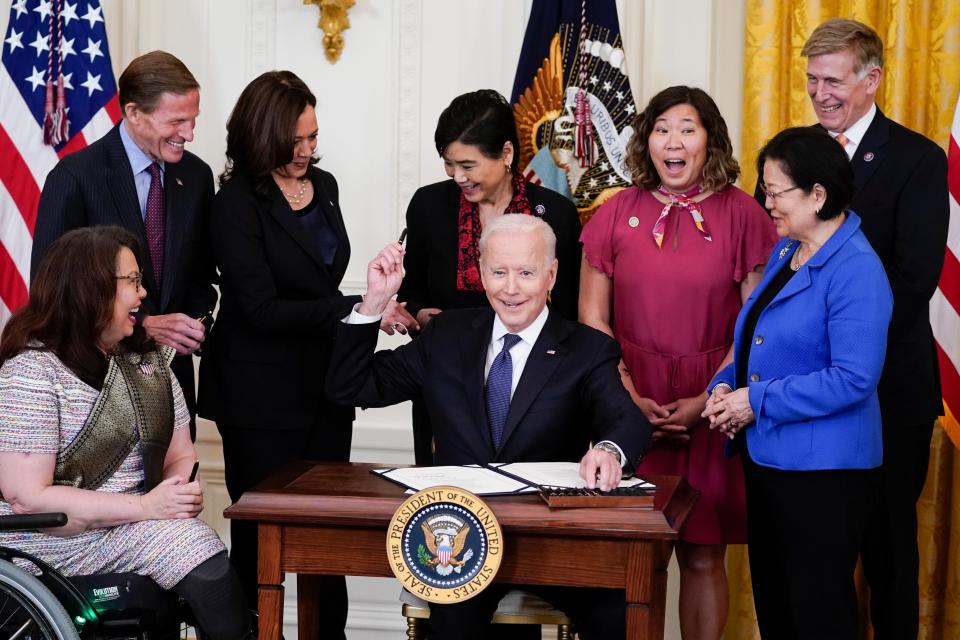Asian Americans say fears linger in Atlanta despite progress two years after shootings
Two years have passed since eight people – including six Asian women – were shot to death at three spas in Atlanta, the collective shock and grief only exacerbating the Asian American community's concerns over increasing incidents of anti-Asian hate nationwide.
As the country rallied in unprecedented support, the moment appeared rife with opportunity, sparking intensified activism within the community and broad-based support from beyond, with statements of solidarity from Black, Latino and Jewish leaders.
Two years later, there are mixed feelings in the community about what progress has been made – and worries about the future should politicians continue to stoke fears and biases ahead of next year’s presidential campaigns.
“I am extremely concerned about heightened violence as we head into another national election where politicians will likely continue to scapegoat immigrants,” said Aarti Kohli, executive director of Asian Americans Advancing Justice-Asian Law Caucus, a legal advocacy agency based in San Francisco.
Others see promise in the fact that the film “Everything, Everywhere, All at Once” won seven Oscars at last weekend’s Academy Awards, saying it reflects new openness to the Asian American experience.
“While we’ve been telling our stories for decades now, there is a greater spotlight on the stories being created,” said Madalene Xuan-Trang Mielke, president and CEO of the Asian Pacific American Institute for Congressional Studies, based in Washington, D.C. “Asian American stories are American stories.”
In the wake of the shootings, many hoped the resulting energy could help boost Asian American representation in political and spiritual leadership, visibility in public school curricula and multilingual offerings in voter ballots, mental health services and outreach by law enforcement.
“We need to make the most of this moment,” Rep. Grace Meng of New York said at the time.
'A reemergence of hostility'
In May 2021, President Joe Biden signed the COVID-19 Hate Crimes Act into law, though key initiatives of the legislation have yet to be launched. Manjusha Kulkarni, co-founder of Stop AAPI Hate, said that while the law’s passage was a significant milestone, data collected by her group indicates the vast majority of reported hate incidents don’t qualify as crimes.
The group tallied 11,500 incidents of anti-Asian bias from March 2020 to March 2022.
CEO of The Asian American Foundation: Two years after the Atlanta spa shootings, AAPI community continues fight to stop hate
“There’s still a lot to be done,” Kulkarni said. “Unfortunately what we’re seeing is a reemergence of hostility.”
That hostility, she said, is evidenced by proposed legislation in states such as Texas, Florida and Arkansas that would ban citizens of China from buying property.
“These are supposed solutions looking for a problem,” Kulkarni said. “Where is the evidence that Chinese nationals have bought real property with an eye toward engaging in spying or other nefarious activities? That’s the new problem we’re seeing – that this hate is now being weaponized by policymakers.”

Biden remains the first president in two decades not to have an Asian American serving at the secretary level. Deputy labor secretary Julie Su, Biden’s nominee to place outgoing labor secretary Marty Walsh, has yet to be confirmed by the Senate.
And while four states – Illinois, New Jersey, Connecticut and Rhode Island – now require teaching of Asian American and Pacific Islander studies in K-12 schools, other such advocacy efforts have been caught up in waves of conservative pushback that including bans on books and ethnic studies instruction.
“You see that, sadly, many folks are not prepared for, nor do they have any interest in, accuracy or thoroughness and bringing in all parts of our community,” Kulkarni said.
In Atlanta, challenges remain
Two years later, advocates in Atlanta say, familiar concerns linger, including a disconnect with law enforcement and disagreements within the community about the degree to which police should be involved in curbing anti-Asian incidents.
“That continues to be a struggle for the Asian American community and, certainly, other communities of color,” said Phi Nguyen, executive director of Asian Americans Advancing Justice-Atlanta.
“Change is obviously slow,” Nguyen said. “But even with that caveat, I don’t feel like there’s been significant change here as a result of the shootings on a systemic level.”

At the time, prompted by the killings, then-Georgia state Sen. Michelle Au had introduced bills addressing gun safety and language-specific social services. Neither progressed in the Republican-led Legislature.
“Despite all the thoughts and prayers from our colleagues, they did not support that in action,” said Au, now a Georgia state representative.
Marian Liou, a civic activist in Atlanta, said city leaders haven’t sufficiently addressed anti-Asian racism or tried to fully acknowledge the community.
“In Atlanta, the lack of intentional inclusion and awareness around Asian and Asian American history and issues – and our growing presence in the region and the wider South – is still disappointingly glaring,” Liou said.
'This is a highly divided moment'
Earlier this year, as Lunar New Year began, lingering anguish over the Atlanta tragedy was compounded by a pair of mass shootings affecting Asian American communities in the California cities of Monterey Park and Half Moon Bay. Eighteen people were killed.
“That was triggering for a lot of folks in Georgia,” Nguyen said. “A lot of grief and trauma is still there, and recent events have reopened some of those wounds.”
The tragedies, she said, also revealed the lack of rapid-response infrastructure in Asian American immigrant communities, especially in terms of cultural and linguistic competence.

Frank Wu, president of Queens College, City University of New York, said that despite Asian American hopes of being recognized “as true Americans,” anti-Asian violence and sentiment persists. Some critics, he said, “even seemed pleased” that the California crimes were perpetrated by Asian Americans.
“They seemed to celebrate that revelation,” he said.
For Asian Americans, Wu said, the atmosphere is fraught with peril, with the community not only swept up in cultural battles but wedged between growing U.S.-China tensions.
“This is a highly divided moment,” he said.
Asian American gains coming from within
Though challenges remain, advocates say, the community can continue to capitalize on the momentum of that time.
“The solidarity was important, and we need that to continue and to increase to deal with the coming threats we’re seeing in 2023,” said Stop AAPI Hate’s Kulkarni, executive director of the AAPI Equity Alliance in Los Angeles.
Some changes already are coming from within the community. Au, the Georgia state representative, said that while the Atlanta shootings were shocking, “that grief really galvanized the Asian American community here in Georgia.”

Two years later, Georgia’s AAPI caucus is among the largest in the nation as Asian American legislators more than doubled from five to 11.
Additionally, Au has since introduced a gun safety bill that would require safe storage of firearms in households where they would otherwise be accessible by a minor. That bill is being heard in committee on Thursday, the anniversary of the shootings.
“Guns are the No. 1 cause of death for kids and teens in the U.S.,” Au said, and in a state typically hostile toward any kind of gun safety legislation, “the fact that we’re getting a hearing is historic.”
Nguyen, of Asian Americans Advancing Justice-Atlanta, said the momentum and sustained level of Asian American activism driven by the tragedy are still in play.
“The hate incidents have continued to inspire engagement,” she said. “But there’s a lot of systems we’re fighting against that take a long time to address and dismantle.”
One bright spot, she said, is that language access is now on the table, with her agency in touch with elections boards in multiple counties. Another is a mayor’s office initiative offering free interpretive services for constituents interacting with city staffers.

In short, more Asian voices are being listened to – not only in reaction to the shootings or anti-Asian violence, Nguyen said, but because of the longtime efforts of local organizers and advocates.
That’s true nationally as well, said Mielke, of the APA congressional studies institute. Though there’s still much work ahead, she said, she’s buoyed by gains in ethnic studies and increased investment in Asian American communities.
Said Mielke, “This isn’t a trend, but a movement.”
This article originally appeared on USA TODAY: Atlanta spa shootings: 2 years later, Asian Americans say bias remains

